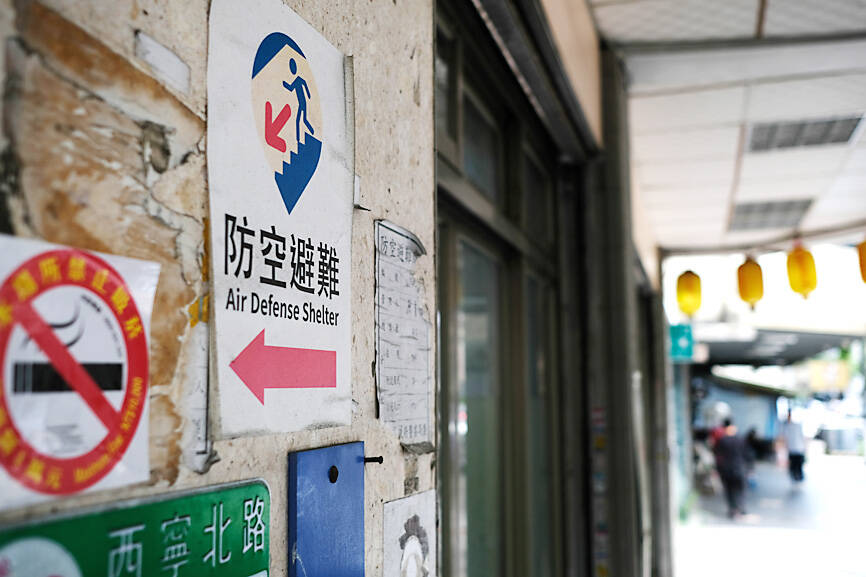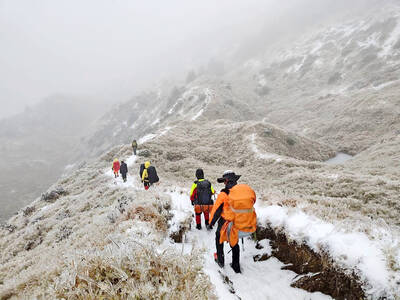The Ministry of the Interior (MOI) has drafted amendments that would increase the size of air defense shelters in new buildings, including schools and factories, to 1m2 per person, with more shelters to be located underground.
The proposed amendments to articles 141, 142 and 144 of the Building Technical Regulations (建築技術規則) were made in consideration of the likelihood that airstrikes would most likely be missile attacks, it said.
The draft amendments would require that shelter ventilation systems be mechanical, connect to emergency power supplies and provide a ventilation rate of at least 25m3 per hour per square meter of floor space.

Photo: CNA
Emergency lighting and power outlet devices would be installed in shelters, while requirements would be updated for door and window fireproofing, the draft says.
Washrooms would also be a required fixed feature in newly built air defense shelters.
The draft cited standards employed in other countries for public evacuation spaces used for short-term shelter, meaning one day or less.
For example, Finland requires a minimum of 0.75m2 per person, while South Korea mandates 0.825m2 and Switzerland 1m2, it says.
Current guidelines in Taiwan stipulate a minimum of 0.75m2 per person, which would be increased to 1m2, mainly for new buildings, an official with knowledge of the matter said.
The Building Technical Regulations, which mostly concern new buildings, allow for 0.9m2 per person according to calculations by the National Police Agency, which can be increased to 1m2, the official said.
The draft amendments would also require that reinforced concrete be at least 30cm thick for shelter walls, ceilings and spaces surrounding above-ground entrances and exits.
Current regulations call for a thickness of 24cm, below the 30cm enforced in South Korea, Switzerland and Singapore, the draft amendments say.

Trips for more than 100,000 international and domestic air travelers could be disrupted as China launches a military exercise around Taiwan today, Taiwan’s Civil Aviation Administration (CAA) said yesterday. The exercise could affect nearly 900 flights scheduled to enter the Taipei Flight Information Region (FIR) during the exercise window, it added. A notice issued by the Chinese Civil Aviation Administration showed there would be seven temporary zones around the Taiwan Strait which would be used for live-fire exercises, lasting from 8am to 6pm today. All aircraft are prohibited from entering during exercise, it says. Taipei FIR has 14 international air routes and

The Ministry of National Defense (MND) today released images of the military tracking China’s People's Liberation Army (PLA) movements during the latest round of Chinese drills around Taiwan. The PLA began "Justice Mission 2025" drills today, carrying out live-fire drills, simulated strikes on land and maritime targets, and exercises to blockade the nation's main ports. The exercises are to continue tomorrow, with the PLA announcing sea and air space restrictions for five zones around Taiwan for 10 hours starting from 8:30am. The ministry today released images showing a Chinese J-16 fighter jet tracked by a F-16V Block 20 jet and the

Snow fell on Yushan (Jade Mountain, 玉山) yesterday morning as a continental cold air mass sent temperatures below freezing on Taiwan’s tallest peak, the Central Weather Administration (CWA) said. Snowflakes were seen on Yushan’s north peak from 6:28am to 6:38am, but they did not fully cover the ground and no accumulation was recorded, the CWA said. As of 7:42am, the lowest temperature recorded across Taiwan was minus-5.5°C at Yushan’s Fengkou observatory and minus-4.7°C at the Yushan observatory, CWA data showed. On Hehuanshan (合歡山) in Nantou County, a low of 1.3°C was recorded at 6:39pm, when ice pellets fell at Songsyue Lodge (松雪樓), a

NO SHAME IN RETREAT: Hikers should consider turning back if the weather turns bad or if they do not have sufficient equipment, the Taroko park headquarters said Two people died of hypothermia over the weekend while hiking on Hsuehshan (雪山), prompting park authorities to remind hikers to bring proper equipment and consider their physical condition before setting out in the cold weather. Temperatures dropped over the weekend, bringing snow to high altitudes in Shei-pa National Park. One hiker, surnamed Lin (林), who on Friday was traveling with a group of six along the Hsuehshan west ridge trail, lost consciousness due to hypothermia and died, the Shei-pa National Park Headquarters said. On Saturday, another hiker, surnamed Tien (田), in a group of five on the southeast of the west